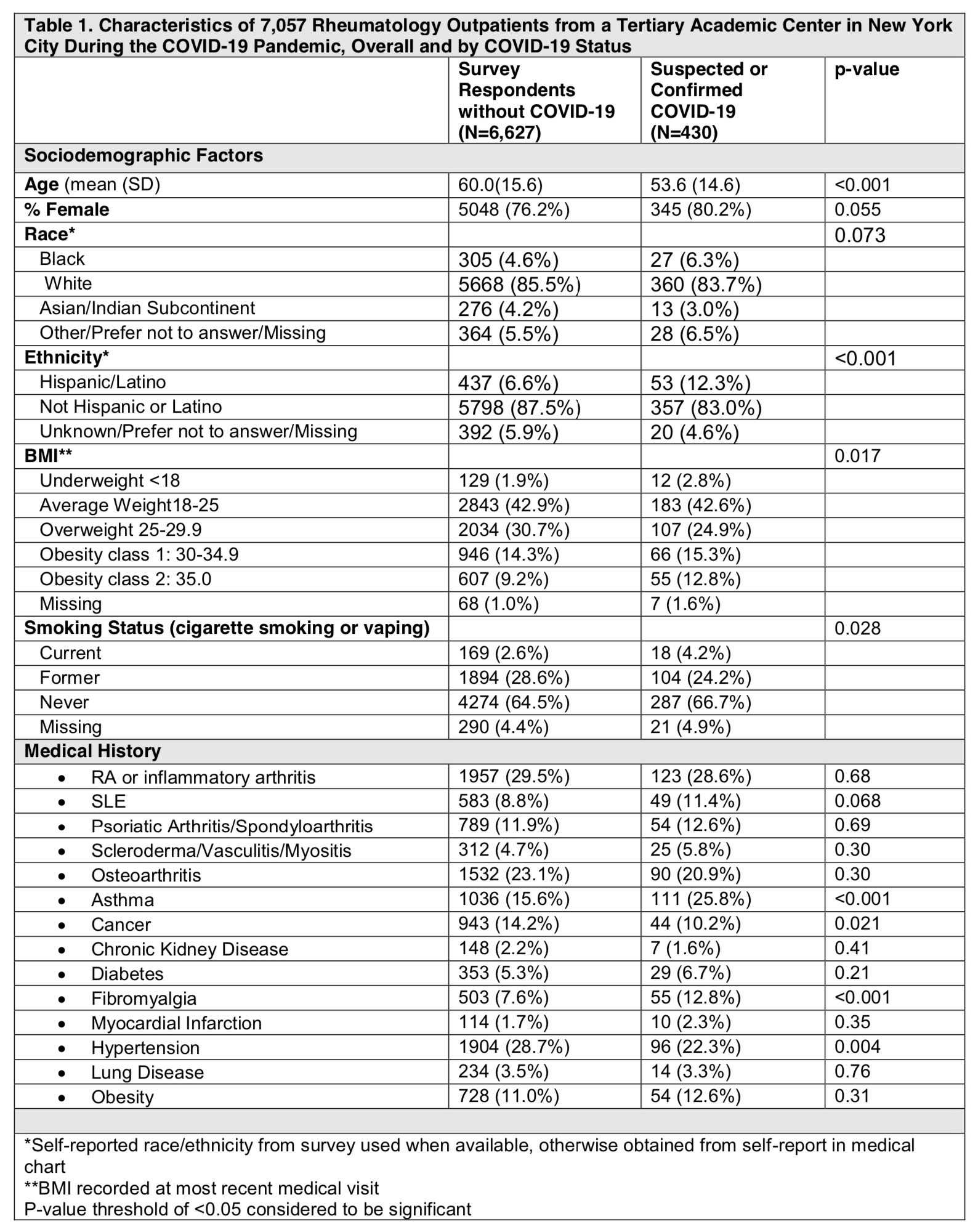Session Information
Date: Friday, November 6, 2020
Title: Epidemiology & Public Health Poster I: COVID-19 & Rheumatic Disease
Session Type: Poster Session A
Session Time: 9:00AM-11:00AM
Background/Purpose: The incidence and disease severity of COVID-19 in rheumatic disease patients, who may be at higher risk due to underlying immune dysregulation and use of immunomodulatory medications, remains poorly understood. We evaluated the characteristics of rheumatology outpatients with suspected or confirmed COVID-19 in New York City during the pandemic “surge”.
Methods: We emailed a secure web-based survey to 26,045 patients ≥18 years old evaluated at least once by a rheumatologist between April 1, 2018-April 21, 2020 at a tertiary care academic center in New York City. Patients were invited to complete the survey by email or phone between April 24, 2020 and May 26, 2020. Information collected included potential COVID-19 exposures, symptoms, and diagnoses, rheumatic and general medical history, and medication use. COVID-19 was suspected if patients were diagnosed by a healthcare worker or was confirmed if they reported a positive nasopharyngeal PCR test. T-tests, Fischer exact tests or chi-squares were used as appropriate to compare characteristics in patients with suspected/confirmed COVID-19 compared to those without, and in the subgroup of suspected/confirmed COVID-19 patients whose presentation was severe enough to require emergency room (ER) visit or hospitalization.
Results: Of the 7,057/26,045 (27.1%) who responded to our survey, 430/7,057 (6.1%) reported suspected/confirmed COVID-19. Mean age of patients with suspected/confirmed COVID-19 was lower than those without COVID-19 (53.6 [14.6] years vs. 60.0[15.6] years). There was a higher prevalence of Hispanic ethnicity, obesity, and current smoking or vaping in patients with suspected/confirmed COVID-19, as well as asthma, cancer, fibromyalgia and hypertension (Table 1). Although not significant, suspected/confirmed COVID-19 patients had a higher prevalence of SLE. Patients with COVID-19 had higher use of hydroxychloroquine, abatacept and belimumab in the preceding 6 months, and were more likely to have had a close contact with a person with COVID-19 (Table 2). In the subgroup with suspected/confirmed COVID-19, 79/430 (18.4%) presented to the ER or were hospitalized; age, race, ethnicity, education, income, BMI and smoking status were similar compared to those who did not (Table 3). However, ER/hospitalized patients were more likely to report SLE or Fibromyalgia and to use anti-malarials and conventional DMARDs. No difference in COVID-19 exposure status from close contact with an affected individual (p 0.24) or time spent at home (p 0.61) was noted in those who went to ER/hospitalized.
Conclusion: During the peak of the COVID-19 pandemic, 6.1% of rheumatology patients surveyed at a large, specialty hospital in NYC reported suspected/confirmed COVID-19, of whom 18.4% went to the ER or were hospitalized. This is likely a conservative estimate as those ill from COVID-19 may not have responded to our survey. Our findings provide insight into potential characteristics associated with the incidence and disease severity of COVID-19 in rheumatic disease patients in a COVID-19 “hot spot” during the pandemic.
To cite this abstract in AMA style:
Barbhaiya M, Vitone G, Frey M, Jannat-Khah D, Feldman C, Lally L, Bass A, Salmon J, Crow M, Lockshin M, Bykerk V, Mandl L. Characteristics of Rheumatology Outpatients with Suspected or Confirmed COVID-19 During the Pandemic in New York City [abstract]. Arthritis Rheumatol. 2020; 72 (suppl 10). https://acrabstracts.org/abstract/characteristics-of-rheumatology-outpatients-with-suspected-or-confirmed-covid-19-during-the-pandemic-in-new-york-city/. Accessed .« Back to ACR Convergence 2020
ACR Meeting Abstracts - https://acrabstracts.org/abstract/characteristics-of-rheumatology-outpatients-with-suspected-or-confirmed-covid-19-during-the-pandemic-in-new-york-city/



